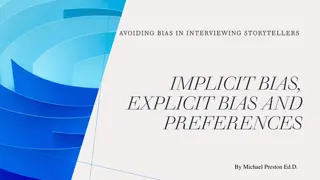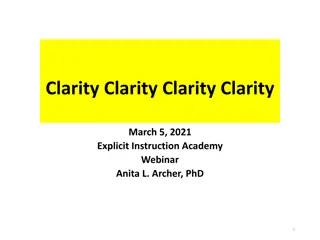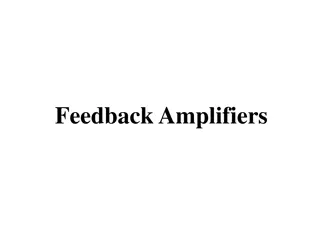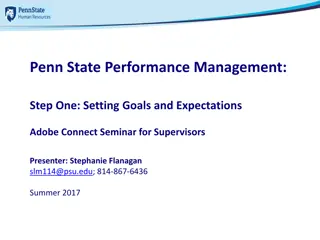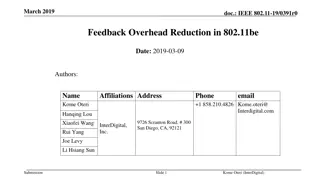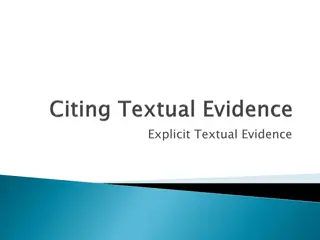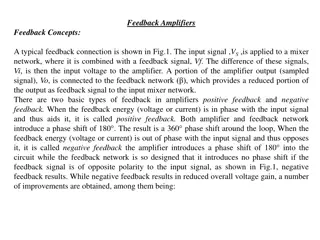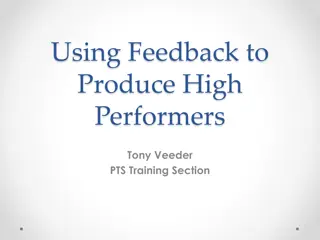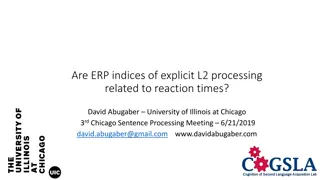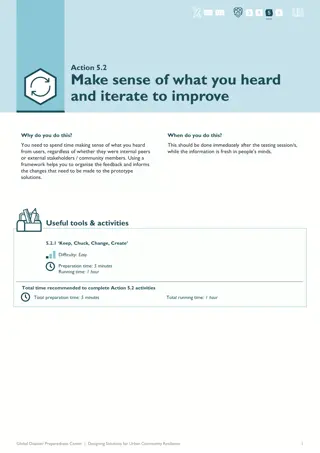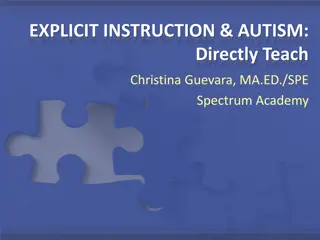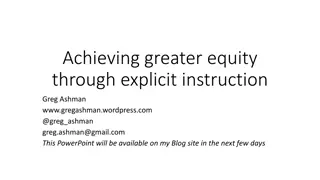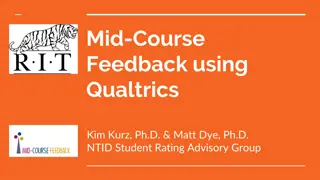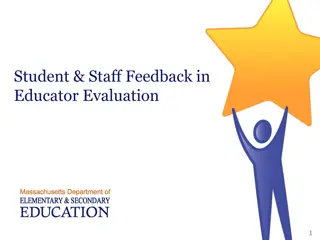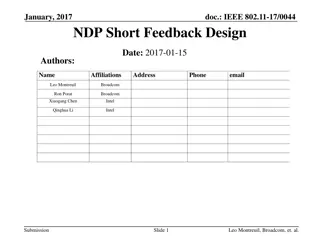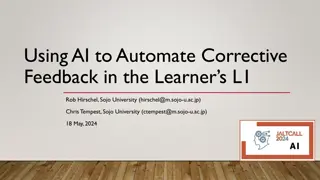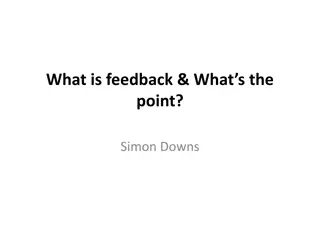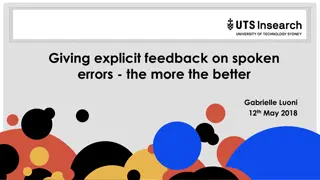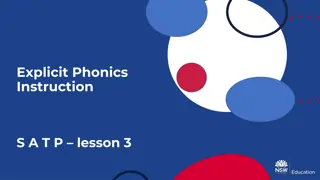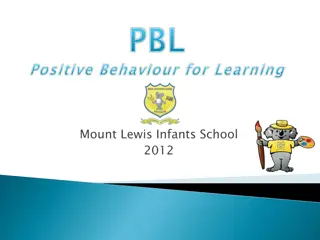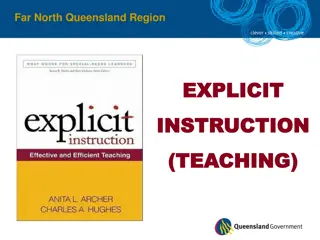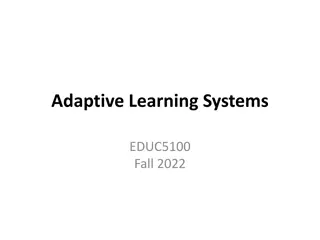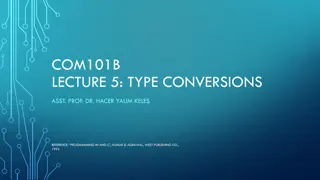Enhancing Student Learning Through Effective Feedback Strategies
Effective feedback plays a crucial role in improving student learning outcomes by providing specific information that students can use to enhance their performance. This content explores the importance of feedback, examples of good feedback practices, qualities of good feedback, and what components
5 views • 16 slides
Principles of Teaching Grammar: Key Recommendations and Session Outline
Explore the principles of teaching grammar outlined by Dr. Rowena Kasprowicz and Professor Emma Marsden, focusing on providing explicit descriptions, practice in input and productive language use, utilization of standard terminology, and building on knowledge from key stage 2. The session outline co
3 views • 43 slides
OPEN LETTER Heidi Camacho.
Open letters serve as a powerful means of communication, reaching a wide audience while addressing specific individuals or entities. These public letters aim to spark discussion, advocate for change, or shed light on social issues. By maintaining a direct and persuasive tone, open letters engage rea
0 views • 5 slides
Understanding and Overcoming Bias in Interviewing
Bias in interviewing can arise from implicit and explicit prejudices, impacting perceptions and interactions with interviewees. Implicit biases are unconscious, while explicit biases are deliberate. Recognizing and addressing biases is essential to conduct fair and effective interviews. Examples ill
0 views • 17 slides
Understanding the Importance of Clarity in Explicit Instruction
Explicit instruction is closely tied to teacher clarity, which involves behaviors that help students comprehend and retain information. Achieving clarity in communication is vital for effective teaching, as it ensures understanding and engagement between teachers and students.
0 views • 30 slides
Effective Feedback Strategies for Learning Enhancement
Feedback plays a crucial role in the learning process. This session focuses on strategies for providing effective feedback to improve learning outcomes, course, and assignment design, best practices, and tools for efficient feedback delivery. Understanding the importance of prompt feedback and diffe
3 views • 20 slides
Understanding Feedback Amplifiers: Structure, Properties, and Topologies
Electronic circuits rely heavily on feedback mechanisms, particularly negative feedback, for various purposes such as desensitizing gain, reducing distortion, controlling impedance, and improving amplifier bandwidth. This article explores the general structure of feedback, properties of negative fee
0 views • 68 slides
Effective Performance Management: Setting Goals and Expectations Seminar Overview
Gain insights into performance management through aligning goals, setting expectations, and fostering ongoing conversations for staff development. Understand the importance of goal alignment, assessment, feedback, and calibration in achieving organizational objectives. Explore the role of supervisor
0 views • 17 slides
Reduction of Feedback Overhead in IEEE 802.11be
Discussion on reducing channel acquisition overhead to support 16 Spatial Stream MIMO and Multi-AP coordination in IEEE 802.11be. Methods include limiting feedback information, using implicit feedback in reciprocal systems, and improving explicit and implicit feedback schemes.
0 views • 14 slides
Enhancing Feedback Practices with Audio-Visual Technology: A Study on Student Satisfaction and Attainment
This presentation delves into the implementation of Audio-Visual Feedback (AVF) technology to improve assessment feedback practices in an educational institution. The study explores the impact of AVF on student satisfaction levels compared to traditional written feedback, as well as its influence on
0 views • 21 slides
Mastering Explicit Textual Evidence in Reading Comprehension
Enhancing reading comprehension by utilizing explicit textual evidence to support ideas and opinions about the text. Learn how to clearly state ideas, specify text references, and comment on evidence to bolster your interpretations effectively.
0 views • 15 slides
Understanding the Importance of Feedback in Achievement Enhancement
Feedback plays a crucial role in encouraging or discouraging behavior, making it essential to provide constructive feedback that focuses on growth and improvement. Improper feedback can lead to incompetence in the workplace. Learn about the definition of feedback, how to give feedback effectively, a
2 views • 22 slides
Understanding Feedback Amplifiers in Electronic Circuits
Feedback amplifiers play a crucial role in electronic circuits by providing mechanisms for controlling gain, stability, and overall performance. There are two basic types of feedback - positive and negative, each offering distinct advantages. The four ways of connecting feedback signals involve volt
0 views • 18 slides
Understanding Argumentation: Exploring Explicit and Implicit Arguments
Argumentation is a creative and productive activity that involves critical thinking and inquiry, often in conversation with respected individuals. While argument may seem like a fight or quarrel to some, it is actually a process aimed at finding the best solutions to complex problems rather than jus
0 views • 13 slides
Enhancing Feedback Strategies in ELA Learning Project Day
Refine understanding of ELA, engage with student exemplars, and design constructive feedback in a structured agenda. Activities include generating feedback, digging deeper into feedback processes, and considering the impact of timely and specific feedback on student growth in learning and skills. Co
0 views • 31 slides
Effective Feedback Strategies for Resident Teachers
Effective feedback is critical for the growth of resident teachers. This guide covers types of feedback, why it's important, what makes feedback effective, behaviorally anchored rating scales, models for giving feedback, and key tips for delivering feedback successfully.
0 views • 14 slides
Effective Feedback Strategies for High Performance
Feedback plays a crucial role in helping individuals improve performance and reach their full potential. From providing helpful feedback to reinforcing desired behaviors, this guide explores various strategies, including redirection, reinforcement, and F.A.S.T. feedback, to enhance workplace perform
0 views • 21 slides
Enhancing Postgraduate Academic Writing: Feedback Collaboration Model
Developing a collaborative model for postgraduate academic writing courses involves understanding the role of feedback, focusing on content feedback, and exploring the intersections between discipline specialist and writing tutor feedback to improve academic writing abilities. Feedback offers valuab
1 views • 27 slides
Implicit vs. Explicit Processing in L2 Learning and Reaction Times
In second language research, the focus on implicit versus explicit processing is crucial for theory and pedagogy. Research by Batterink et al. (2014) explored L2 learning without awareness, revealing varied effects on reaction times and ERP responses based on participants' awareness of hidden gramma
0 views • 28 slides
Iterative Feedback Framework for Prototype Improvement
The iterative feedback framework involves making sense of user feedback using the Keep, Chuck, Change, Create (KCCC) model to iterate and enhance prototype solutions. This process helps organize input from testing sessions, informing necessary modifications for better outcomes. The framework emphasi
1 views • 26 slides
Explicit Instruction & Autism by Christina Guevara, MA ED./SPE Spectrum Academy
Step by Step Explicit Instruction Theory into Practice with behavior-based methods like the Incredible 5-Point Scale. This systematic method focuses on modeling, prompted practice, and unprompted practice to teach skills effectively. Different behavior-based techniques such as Task Analysis, Chainin
0 views • 12 slides
Explainable Recommendation Using Attentive Multi-View Learning
The research presented at the 33rd AAAI Conference on Artificial Intelligence focuses on developing an explainable deep model for recommendation systems. It addresses challenges in extracting explicit features from noisy data and proposes a Deep Explicit Attentive Multi-View Learning Model. This mod
0 views • 19 slides
Achieving Greater Equity Through Explicit Instruction by Greg Ashman
Explore the key principles of explicit instruction, direct instruction, and traditional teaching methods outlined by Greg Ashman. Learn about effective strategies such as Distar, lecturing, and active learning to enhance student understanding and success. Delve into the research-based strategies adv
0 views • 24 slides
Understanding Mid-Course Feedback Using Qualtrics
Mid-Course Feedback (MCF) is a valuable process that allows students to provide feedback on their courses mid-semester, impacting teaching strategies, communication, materials, and more. This feedback benefits both students and instructors by improving teaching effectiveness, student satisfaction, a
0 views • 21 slides
Importance of Student and Staff Feedback in Educator Evaluation
Student and staff feedback plays a crucial role in educator evaluation, providing valuable insights into areas of strength and growth. Informed by evidence such as surveys, observations, and artifacts, feedback helps educators tailor their practice, fostering two-way communication and professional d
0 views • 14 slides
Enhancing Literacy Instruction with Explicit Strategies
Explicit instruction is a direct, clear, and effective teaching approach that empowers students to learn independently. This method emphasizes structured guidance, practice, and feedback to ensure comprehension and skill development. Cognitive planning focuses on critical content and big ideas, such
0 views • 13 slides
Understanding Cascade Control Systems in Industrial Processes
Cascade control systems play a crucial role in improving process control efficiency by incorporating feedback loops within feedback loops. This type of control architecture helps to better handle disturbances and variations in the process by creating secondary loops that monitor specific parameters.
0 views • 8 slides
IEEE 802.11-17/0044 NDP Short Feedback Design
The document discusses the need for short simultaneous feedback from multiple STAs in IEEE 802.11 systems for improved efficiency. It introduces the NDP feedback mechanism and proposes a signaling technique to efficiently collect feedback from a high number of STAs. The mechanism involves UL MU tran
0 views • 19 slides
AI Automation for Corrective Feedback in Language Learning
Exploring the utilization of AI technology to automate and enhance corrective feedback in language learning, addressing challenges such as time constraints, delayed feedback, and student comprehension. Introduction of a new AI text tool by Marcus Green for accessible and effective feedback provision
0 views • 13 slides
Enhancing Research Appointment Services at UMBC Library
UMBC subject librarians implemented a feedback survey to improve research appointment services. By analyzing feedback data, shared best practices were developed to ensure quality and consistency. The project timeline included identifying goals, drafting the timeline, creating the feedback form, and
0 views • 7 slides
Understanding the Importance of Feedback in Learning and Development
Feedback plays a crucial role in providing information about performance or behavior to affirm strengths and improve weaknesses. It helps individuals become consciously competent by identifying areas for improvement through formative assessment. Effective feedback enhances motivation, promotes learn
0 views • 33 slides
Enhancing Language Learning Through Explicit Feedback on Spoken Errors
This presentation by Gabrielle Luoni explores the impact of explicit feedback on spoken errors in language learning. It delves into how teachers respond to student errors, the types of corrections used, and students' uptake of these corrections. Background reading, metalanguage examples, and researc
0 views • 28 slides
IEEE 802.11-19/0709r0 - Immediate and Delayed Feedback May 2019
The document discusses immediate and delayed feedback mechanisms in IEEE 802.11-19/0709r0, focusing on parameters, feedback types, and ranging options. It explores variations in feedback direction and types, proposing options for phase shift feedback and distinguishing between RSTA-to-ISTA and ISTA-
0 views • 6 slides
Explicit Phonics Instruction S.A.T.P Lesson 3
Explore the explicit phonics instruction lesson focusing on the S.A.T.P graphemes representing phonemes to enhance reading and spelling skills. Follow the NSW Department of Education's learning intention and success criteria to effectively use graphemes in reading and writing words. Engage with a se
0 views • 26 slides
Positive Behaviour for Learning at Mount Lewis Infants School
Positive Behaviour for Learning (PBL) is a proactive system implemented at Mount Lewis Infants School to teach and encourage positive behaviors among students. The initiative focuses on safety, respect, and fostering a positive learning environment through explicit teaching, modeling, and reinforcem
0 views • 16 slides
Effective Explicit Instruction in Teaching: Far North Queensland Region
Validation of explicit instruction's effectiveness in research for general and special education, emphasizing its importance for all students. Characteristics and elements of explicit instruction are outlined, focusing on clear statements, demonstrations, feedback, and mastery. Key teaching function
0 views • 30 slides
Product Feedback Forum at NWS: Provisional PS-PVR User Feedback on ABI, CMI, and L1b
A comprehensive feedback system managed by PRO at NWS, focusing on user input for GOES-R products such as ABI, CMI, and L1b. The forum gathers feedback through surveys and weekly calls, addressing product quality issues and ensuring effective communication with field sites. Noteworthy discussions in
0 views • 18 slides
Understanding Feedback in Learning Systems
Exploring the role of feedback in educational settings, this content delves into the concept of providing information to learners by various agents. It discusses the importance of feedback in guiding learning progress, highlighting examples of correctness feedback and correct answer feedback. The be
0 views • 66 slides
Understanding Type Conversions in ANSI C Programming
This content delves into type conversions in ANSI C programming, covering automatic and explicit conversions, unary and binary conversions, with examples and explanations. It discusses how different data types are handled in arithmetic operations, including the promotion of lower types to higher typ
0 views • 10 slides
Feedback and Mentoring Workshop for HIV Researchers
Mentoring workshop for HIV researchers focusing on giving and receiving feedback, nurturing early career investigators, and working with faculty continuum. The workshop offers insights on feedback exercises, assumptions, and rhetorical questions about feedback. Participants are encouraged to reflect
0 views • 33 slides



